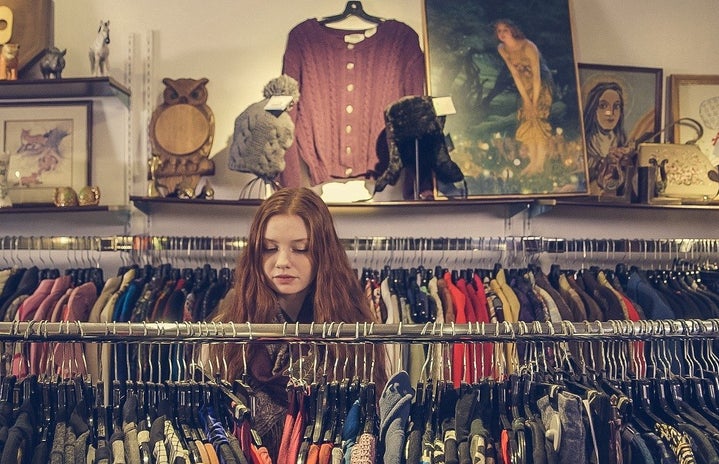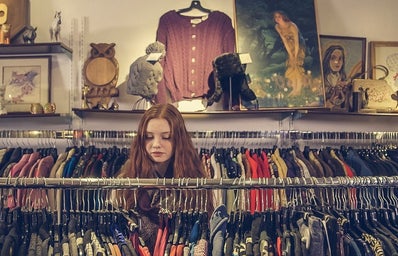As the global climate catastrophe looms over our heads, many of us are scrambling for ways to take matters into our own hands to avoid this. Most of the actions that we take every day somehow negatively impact the environment — whether it be driving a car, buying food wrapped in excessive amounts of plastic or wasting water during our showers. One of the things that we unknowingly participate in that impact our environment is fast fashion.
As defined by Good On You, fast fashion is “cheap, trendy clothing, that samples ideas from the catwalk or celebrity culture and turns them into garments in high street stores at breakneck speed.” As opposed to the traditional model of the fashion industry in which clothes are created on a seasonal basis, fast fashion companies that we all know such as Forever 21 and H&M produce clothing at a weekly rate. There are many issues with the fast fashion industry including the underpayment of garment workers, the cheap, toxic synthetic materials that create fast fashion pieces and the overproduction of garments. Due to these factors, questionably cheap clothing has become the norm and taken a role in the climate change conversation.
As a low-income college student, I understand that it may be difficult to imagine not purchasing from these brands, and I’m here to let you know that there are still ways to dress sustainably without hurting your wallet. While ethical, sustainable fashion brands have been a very popular solution, they’re often not as accessible for college students that often don’t have $80 to splurge on leggings. Here are some tips if you’re looking to get into sustainable fashion without hurting the bank.
- Wear what you have
-
One of the most sustainable things you can do is to simply wear what you have. While many of us hate repeating outfits, the planet will love you for it! You can put your creative energy to work by thinking of new ways to style the pieces you currently own and creating a ton of outfits. By doing so, not only do you save your money, but you also get the most use out of these pieces before they end up in a landfill.
- Shop intentionally
-
The main point I want to stress is that you don’t need to shop from sustainable brands in order to live sustainably. You should try to shop intentionally instead of in an excessive and careless manner (as has been popularized by the fast fashion industry, sigh). Rather than buying clothes whenever you get the itch to spend money, remember to buy only when you need it. Try to focus on buying articles of clothing that you will wear repeatedly, instead of clothes you’ll toss out for a new version next year. Additionally, look for pieces you can style in different ways to get even more use out of it! Whenever possible, try to spend a couple of extra bucks on clothing that will last you longer as well, so you don’t have to repurchase basic staples. It’s better to waste a bit more money on a piece that will last you a long time than to waste little money on something you’ll have to replace every two months.
- Thrift!
-
This is a highly debated topic within the sustainability community, but thrifting can definitely be a way to give clothing a second life. It’s risen in popularity among younger people due to its accessibility in terms of pricing and the different clothing you can find. Thrift stores have seasonal picks and high-end brands that help you shop sustainably while keeping the cost relatively low. Many people have found high-end clothing for jaw dropping prices while thrift shopping and swear by their local thrift stores selections. While I am not one of the best thrift shoppers, I’ve been able to find some of my closet staples by digging in deep within thrift shop racks. I recommend keeping your mind open to the different ways you can style a piece and trying out different stores around your area. I had to try around four different thrift stores before I found my favorite store, so definitely stay hopeful if it isn’t love at first sight.
- Take care of your clothing
-
While fast fashion intends to make clothing cheaply so you have to buy more, you can avoid this by making sure you take care of the clothing you already have. Synthetic clothing, sweaters and denim clothing should be air-dried as opposed to machine dried since the heat can damage the fibers of the piece. Delicate items should also be air-dried, but you should also hand wash them for ultimate care. Another way to take care of your clothing is by mending small tears and issues that your garments may experience. It may seem daunting, but learning to sew enough to repair these little issues is easier than you might expect. With just a couple of YouTube tutorials, I was able to learn how to fix most clothing issues such as a loose button or a tear in my jeans.
- Create your own clothing
-
Yes, you read that right. Creating your own clothing seems more complicated than it really is, but it is incredibly satisfying to see the end result. A secret tip is that you don’t have to actually create the garment from scratch, you can just upcycle. It’s simple to give clothes that you currently have in your closet a different look by upcycling them. Whether it be by bleach, tie-dying, cutting, embroidering, painting or stitching different pieces together, you can upcycle clothes in so many ways. You can also learn how to knit or crochet your own pieces if you’re up for the challenge. Over the quarantine, I taught myself how to crochet through more YouTube tutorials (shoutout to the internet), and now I have a variety of pieces that I constantly get complimented on.
While it may be hard to separate ourselves from the fast fashion industry, these are the baby steps you can take to do so. Remember to not be harsh on yourself if fast fashion is your only choice, but try to stay as intentional as possible with your purchases. Once you change your mindset, you’ll be able to stray away from fast fashion with much more ease!



